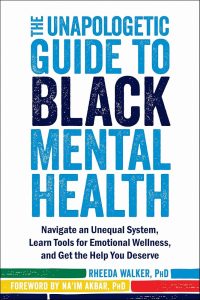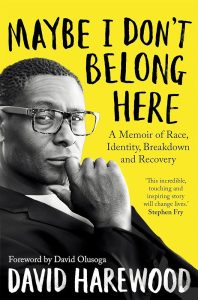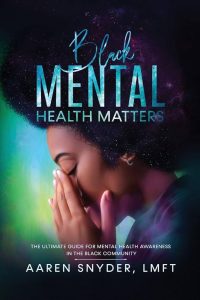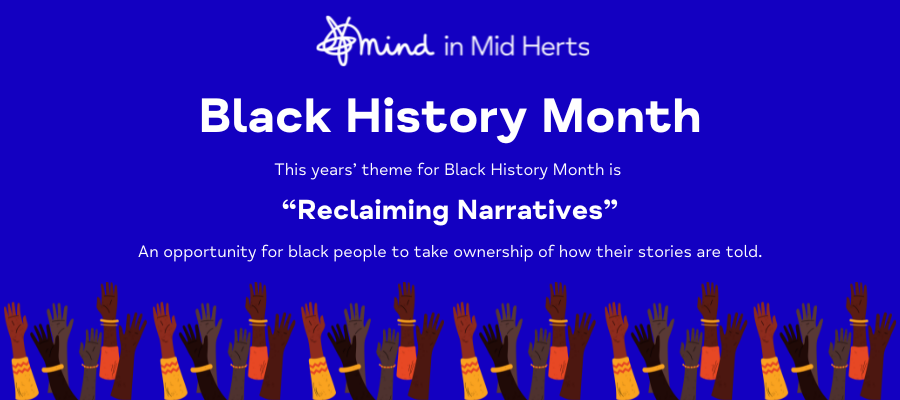Black History Month: Celebrating Mental Health Awareness and Resilience in the Black Community
A chance to celebrate the stories of the black community and reflect on how these affect the mental health of people involved.
Black History Month Facts
Black History Month has been celebrated every October since 1987 in the UK. We use it as chance to reflect on the experiences of the black community, reflect on racism and how this affects people’s mental health, and celebrate the stories of black people in the UK.
It serves as a reminder that Black history is an integral part of the UK’s history and culture.
Black History Month Theme
The theme for this year’s Black History Month is “reclaiming narratives”. This theme is not only a chance to reflect on the history of the black community, but an opportunity for black people to take ownership of how their stories are told. People tell stories in all sorts of different ways, through art, writing, music and video for example.
This theme encourages us to shine a spotlight on the stories, heroes, and the everyday individuals who have made an impact on our communities.
You can find out more about Black History Month and this year’s theme here:
Black Mental Health
- People from Black communities are more likely than average to experience a common mental health problem in any given week.
- 8% of Black or Black British adults have symptoms relating to post-traumatic stress disorder compared with 4% of their White British counterparts.
- Experiences of racism have been linked to an increased likelihood of developing depression; hallucinations and delusions; and if physical assault is involved, post-traumatic stress
You can find more facts and figures around the mental health of racialised communities in this report conducted by National Mind: Facts and figures about racism and mental health – Mind
Why it’s important to know your cultural history for your mental health
Having a full understanding of your cultural history can have a positive effect on our mental health for many reasons:
- Knowing our cultural background gives us a sense of self, and strengthens our identity, and sense of belonging. Knowing our heritage shapes the way we see ourselves.
- Our culture provides a sense of community. Feeling connected with our community can make us feel seen and heard, and we can share experiences which in turn, reduces loneliness.
- By exploring your cultural history, you can draw upon your ancestry’s resilience, creativity, and innovation, making us feel empowered. Great pride comes from fully understanding and taking ownership of black stories.
- You may feel inspired and positive, and able to use these feelings in your own life.
- There’s no guilt around not knowing enough about your heritage.
If you’re looking to be inspired by black stories this Black History Month, or interested in black mental health, here are some ideas where to start:
3 Books to Read

The Unapologetic Guide to Black Mental Health: Navigate an Unequal System, Learn Tools for Emotional Wellness, and Get the Help You Deserve
By Rheeda Walker PhD
An unapologetic exploration of the Black mental health crisis—and a comprehensive road map to getting the care you deserve in an unequal system.
 Maybe I Don’t Belong Here: A Memoir Of Race, Identity, Breakdown and Recovery
Maybe I Don’t Belong Here: A Memoir Of Race, Identity, Breakdown and Recovery
By David Harewood
A black kid from Birmingham, an award-winning actor that’s shaken hands with Sidney Poitier, a man that’s been sectioned. Twice.
Maybe I Don’t Belong Here takes you on David’s journey of mental health crises and eventual recovery and success.
 Black Mental Health Matters: The Ultimate Guide for Mental Health Awareness in the Black Community. Kindle Edition
Black Mental Health Matters: The Ultimate Guide for Mental Health Awareness in the Black Community. Kindle Edition
by Aaren Snyder
Because of a legacy of oppression, black people have a unique relationship with trauma, depression, anxiety, as well as many other issues. Therefore, to truly understand black mental health, a unique education is required.
5 Artists to look at
5 Black artists using their work to fight the mental health stigma:
Gloria Swain
3 Films to watch
The top three films listed by IMDB for Black History Month:
A dramatization of author Alex Haley’s family line from ancestor Kunta Kinte’s enslavement to his descendants’ liberation.
A chronicle of Dr. Martin Luther King, Jr.’s campaign to secure equal voting rights via an epic march from Selma to Montgomery, Alabama, in 1965
In the antebellum United States, Solomon Northup, a free black man from upstate New York, is abducted and sold into slavery.
Black History Month Events
St Christopher’s Fostering at the Hertfordshire NHS Black History Month in Watford
29 September 2024 – Watford
Brilliant Black British History: Meet the Author – A Black History Month Special Event
11 October 2024 – Hemel Hempstead
Support for your mental health
If you’re looking for support for your mental health, Mind in Mid Herts is here to help you.
Support looks different for everyone, which is why Mind in Mid Herts offers a range of services such as:
- Peer support groups in our centres based in St Albans, Stevenage, Hertford and Hatfield.
- Active groups across Hertfordshire.
- Counselling.
- Living Well guided self-help courses and workshops.
Please use the self-referral form to register and a member of our friendly team will be in touch.
Posted on: 2nd October 2024



